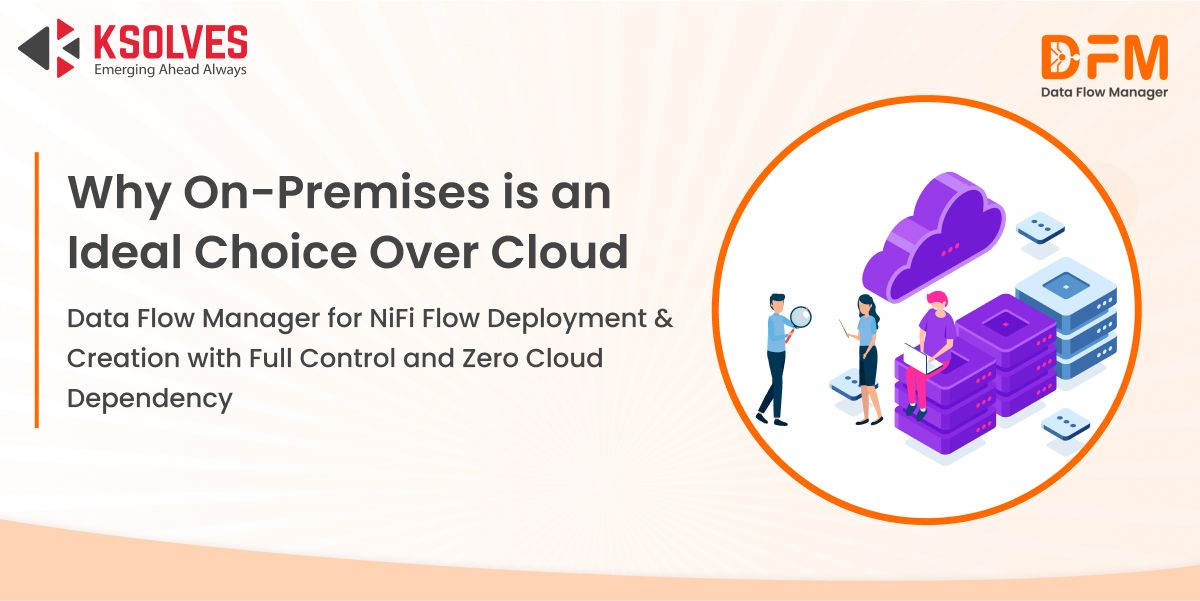Why Should Enterprises Opt for On-Premises Over Cloud for Data Infrastructure
![]()

In the age of big data, where enterprises handle petabytes of sensitive information, making the right infrastructure choice is critical, not just for performance but for the survival of the business.
While cloud environments have been heavily marketed as cheap, flexible, and scalable, the reality for enterprises handling mission-critical workloads is far more complex.
Let’s break down why choosing an on-premises infrastructure over the cloud isn’t just a smart decision, it’s often a necessary one.
The Potential Risks of Trusting Cloud Environments for Your Big Data Workloads
Storing backups or hosting a few files on the cloud? That’s fine.
But putting your entire Big Data pipeline, with high-volume, high-value, and highly sensitive workloads, on the cloud?
That’s where the danger lies.
Here’s what you’re risking by going cloud-first:
- Increased Cybersecurity Threats
Cloud environments are frequent targets for cyberattacks. A single breach could expose customer data, proprietary information, and critical systems to imposters or unauthorized entities.
- Hidden Costs
Many cloud vendors charge per CPU, not per node. One node has CPUs ranging from 2 to 16. So you’re billed for all up to 16 CPUs, even if your application uses only a fraction of that.
- Complete Dependency on Cloud Providers
Relying entirely on cloud providers means your business is subject to their policies, outages, and pricing changes. This lack of control can lead to unexpected disruptions, limited customization, and escalating costs, impacting your ability to respond quickly to evolving business needs.
- Loss of Infrastructure Control
You can’t fully customize or secure what you don’t control.
Why On-Premises is the Ideal Choice for Enterprise-Grade Big Data
When you control your own infrastructure, you control your data.
For businesses managing massive, sensitive, and mission-critical data workloads, the answer is increasingly clear – on-premises infrastructure. It is not just an alternative; it’s a strategic advantage.
On-premises environments offer:
1. Unmatched Security and Data Sovereignty
With on-premises infrastructure, your data never leaves your secured environment. You have complete control over:
- Access management: Define who can view or modify data, down to the most granular level.
- Encryption policies: Enforce your own encryption standards, both at rest and in transit.
- Firewall configurations: Maintain customized perimeter security aligned with your enterprise security posture.
- Zero multi-tenancy risk: No shared environments. No risk of data leaks across tenants.
For organizations operating under strict regulatory frameworks (GDPR, HIPAA, PCI-DSS), on-prem ensures compliance without compromise.
2. Total Customization and Infrastructure Control
In cloud environments, you’re bound by the vendor’s configurations, roadmaps, and update cycles. On-prem frees you from those constraints.
With full infrastructure control, you can:
- Optimize for performance: Tune your architecture for ultra-low latency and high throughput.
- Design for redundancy and fault tolerance: Build multi-site clusters, HA systems, and disaster recovery setups tailored to your business needs.
- Enforce compliance: Meet internal and external audit requirements with ease by maintaining full control over data locality and logging.
- Schedule updates on your terms: No forced upgrades, patches, or downtimes dictated by the provider.
3. Air-Gapped and Immutable Backup Capabilities
Protecting enterprise data from ransomware and insider threats requires more than cloud snapshots. With on-prem, you can implement:
- Air-gapped backups: Physically or logically isolated backup systems, immune to remote access threats.
- Immutable storage: Prevent accidental or malicious deletion by locking files in write-once-read-many (WORM) format.
- Layered security: Combine endpoint protection, network segmentation, and continuous monitoring with total control.
This ensures your business continuity, even in worst-case scenarios.
Data Flow Manager – The Zero-Cloud, On-Premise Tool for Apache NiFi
Designed meticulously for on-premise Apache NiFi, Data Flow Manager is a powerful tool to deploy and promote data flows across multiple clusters in minutes. It eliminates the dependency on the NiFi UI and controller services, so you no longer have to toggle between different NiFi environment UIs like Development, UAT, or Production. In addition, it enables you to create NiFi data flows in just a few minutes by simply entering the source, target, and description in natural language.
Here’s what you can do with Data Flow Manager:
- Create NiFi data flows with a visual designer
- Deploy NiFi flows across your NiFi clusters in minutes
- Manage clusters and environments from a single interface
- Version-control your NiFi flows
- Schedule the deployment of NiFi flows
- Audit log NiFi flow deployments
- Analyze flow performance and structure
All of this – without touching the cloud – No hidden costs. No vendor lock-in. Total control.
And here’s the best part:
We charge per node, not per CPU. While cloud providers typically charge you for every CPU core, ranging from 2 to 16 per node, we keep it straightforward.
With Data Flow Manager, it doesn’t matter how many CPUs a single NiFi node uses, the price stays the same.
This flat, per-node pricing model delivers up to 16x cost savings compared to traditional cloud-based, per-CPU billing models, without sacrificing power, flexibility, or control.
With Data Flow Manager, you’re free to scale your workloads, maximize hardware efficiency, and retain full control over your infrastructure – all at a predictable, transparent cost.
Conclusion
Cloud might look convenient, until your bill spikes, your flows stall, or your data ends up in someone else’s hands. For enterprises that can’t afford downtime, unpredictability, or compromise, on-prem is not just a fallback – it’s a strategic advantage.
With Data Flow Manager, enterprises gain the full power of their Apache NiFi environments – with zero cloud dependency, no hidden charges, and complete infrastructure control. Designed for on-premises environments, it empowers you to orchestrate, scale, and secure your NiFi flows on your terms. It’s more than just cost savings – it’s about owning your infrastructure, protecting your data, and building with confidence.
If you’re serious about secure, scalable, and cost-effective Big Data infrastructure, let us show you how. Email us at sales@ksolves.com.
![]()

